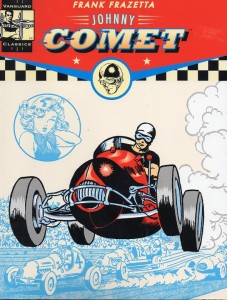Comic Strip Review: Johnny Comet by Frank Frazetta & Earl Baldwin
Before Frank Frazetta hit it big with movie posters and book cover paintings of brawny barbarians and scantily-clad women, he worked in comic books and tried to break into the lucrative newspaper comics business. After a couple of abortive efforts, Mr. Frazetta was hired in 1952 to do the art for Johnny Comet, the tale of a driver of midget race cars.
The strip was written by Earl Baldwin, although the name of Indy 500 winner Peter DePaolo was attached to raise reader interest. Johnny starts the strip loaning a tire to a hapless competitor of his, who goes on to win the race while Johnny crashes his vehicle. Johnny’s idea of becoming a mobile car repairman almost immediately falls through when his jalopy is destroyed in Clover, California.
Fortunately, this puts him in position to help out Jean Fargo, a garage owner who just happens to have a midget car that needs a driver. Aided by engineer “Pop” Bottle, his acerbic wife Mrs. Bottle and mechanic Sparky, Johnny and Jean battle the evil Al Gore(!) and his secret backer, who have good reasons to not want Johnny Comet to win the race.
The writing is kind of mediocre, with the basic plot device of a job opportunity for Johnny or his friends meaning ruin for someone else, who will then resort to violence rather than think of a less criminal way of doing things used repeatedly. Mr. Baldwin was also overfond of resolving plotlines with the karmic death of the villains or an offstage arrest.
The art, on the other hand, was excellent, with Frazetta’s trademark handsome lead, attractive women , vile looking villains–and some very nice-looking cars. There’s some fine craftsmanship on display in these strips. A nice touch early on was the safety tips tucked into panels that let you know not to do the crazy stunts the characters get up to.
Towards the end of the strip, it was reworked, with Johnny being renamed Ace McCoy and becoming a stuntman. There’s one storyline of this, and then the strip was cancelled three installments into the next plot, leaving the characters hanging forever.
The Sunday strips had a separate continuity and are reprinted here in color; they quickly switched to a gag format, mostly about Pop Bottle and Johnny being bumbling men who manage to offend Mrs. Bottle even when they’re trying to help.
There’s also an article on Mr. Frazetta’s comic strip career (he wound up as Al Capp’s assistant on Li’l Abner for eight years.)
If you’re a Frank Frazetta fan, or a midget car racing fan, this is a must-have. Others will want to check it out from the library for the good art and mostly fun read.

